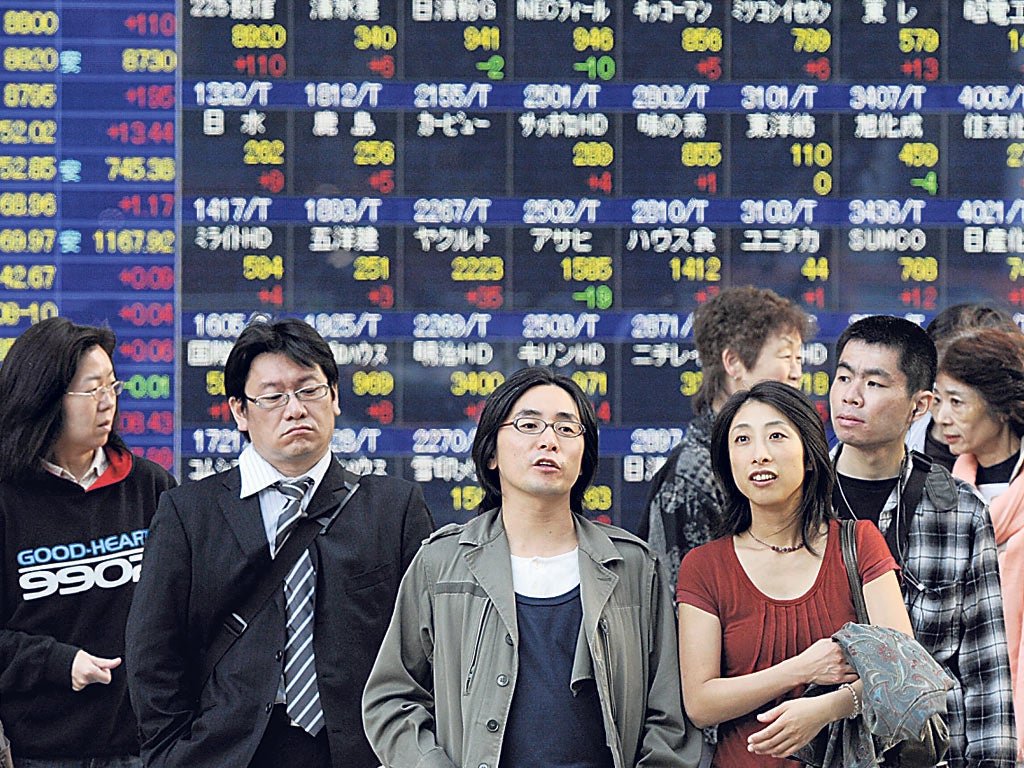Mark Dampier: After 20-year bear market Japan is looking cheap

Your support helps us to tell the story
From reproductive rights to climate change to Big Tech, The Independent is on the ground when the story is developing. Whether it's investigating the financials of Elon Musk's pro-Trump PAC or producing our latest documentary, 'The A Word', which shines a light on the American women fighting for reproductive rights, we know how important it is to parse out the facts from the messaging.
At such a critical moment in US history, we need reporters on the ground. Your donation allows us to keep sending journalists to speak to both sides of the story.
The Independent is trusted by Americans across the entire political spectrum. And unlike many other quality news outlets, we choose not to lock Americans out of our reporting and analysis with paywalls. We believe quality journalism should be available to everyone, paid for by those who can afford it.
Your support makes all the difference.The world's financial markets are fixated on the issues of European sovereign debt. The inability of politicians to get a grip of the situation is allowing markets to dictate the pace as a series of countries fall into the spotlight: Greece, Italy, and now Spain. However, on the other side of the world there is another highly indebted country whose bonds are seen as something of a safe haven, and whose equity market is the cheapest it has been for over 20 years. That country is Japan.
A 20-year bear market has left both domestic and international investors very light in Japan's equity market. Yet there is now good reason to take a second look. On a dividend yield basis, price-to-book basis and, in many cases, a price-to-earnings basis, it is an area that has probably never looked as cheap.
Japanese investors, scarred by two decades of dire returns, have largely chosen to ignore it. In an environment of very low inflation (and periods of deflation) they have been content buying low-yielding Japanese government bonds (JGBs). However, increasing dividends may reignite their interest. Scott McGlashan and Ruth Nash, managers of JO Hambro Japan Fund, are finding a large number of stocks yielding more than 3 per cent, far higher than the yield on 10-year JGBs of just over 1 per cent, and if Japanese investors are enticed into the market by these yields, the effects could be profound.
The managers believe the forthcoming interim results season could provide further impetus. They are confident many companies they own will beat forecasts and use the cash on their balance sheets to either hike dividends or announce share buybacks, a continuation of the recent trend. For instance one holding in the fund, Eizo Nanao, which makes LCD screens for medical devices and (oddly enough) pinball machines, announced a 4.5 per cent share buy-back in September, prompting a significant rally.
Scott McGlashan and Ruth Nash also note that many companies announced their intention to increase dividends at an earlier point in this financial year, an indication of growing confidence. Another interesting trend is that of management buyouts (MBOs). There have been 16 Japanese listed companies acquired via MBO in 2011 at an average premium of nearly 50 per cent to market value at the time, illustrating that company management see considerable value in Japanese firms even if investors don't.
Recently, manufacturing firms have been the poorest performers in Japan due to concerns that exports will slow as global growth weakens. Holdings such as Nitto Denko and NGK have therefore weighed on returns. However, positions in retail stocks such as J Front Retailing, Aoyama Trading and Seven & I have had a beneficial effect, drawing on the recent unexpected strength of retail sales. Far from reeling in the aftermath of the tsunami in March, the Japanese consumer has been loosening the purse strings and the retail sector has been a bright spot in the market.
Clearly events outside Japan such as problems in the eurozone or further slowing of global economic growth could derail any revival. However, disappointment at a corporate level is already factored into Japanese shares. On the whole they are priced as "value destroyers" rather than "value creators", meaning any good news could have a considerable positive effect on the market, and with Japan well-placed geographically (60 per cent of its exports are to Asia), the prospects for many Japanese companies are bright if they can seize the opportunity.
One possible stumbling block for UK investors is a weakening of the yen, which would potentially erode returns in sterling terms. This has been foretold for as many years as I can remember, proving several top economists and fund managers wrong along the way by remaining stubbornly strong. Perhaps at some point it will weaken, but if it does it would probably be more than compensated for by a sharp movement in the Japanese equity market as exporters suddenly become more competitive. As far as the domestic economy is concerned I don't think Japan is going bust any time soon. The vast majority of the debt is held by Japanese investors rather than foreign ones, so unlike European nations its fate is in its own hands – and not at the whim of the international bond markets.
Mark Dampier is head of research at Hargreaves Lansdown, the asset manager, financial adviser and stockbroker. For more details about the funds included in this column, visit www.h-l.co.uk/independent
Join our commenting forum
Join thought-provoking conversations, follow other Independent readers and see their replies
Comments